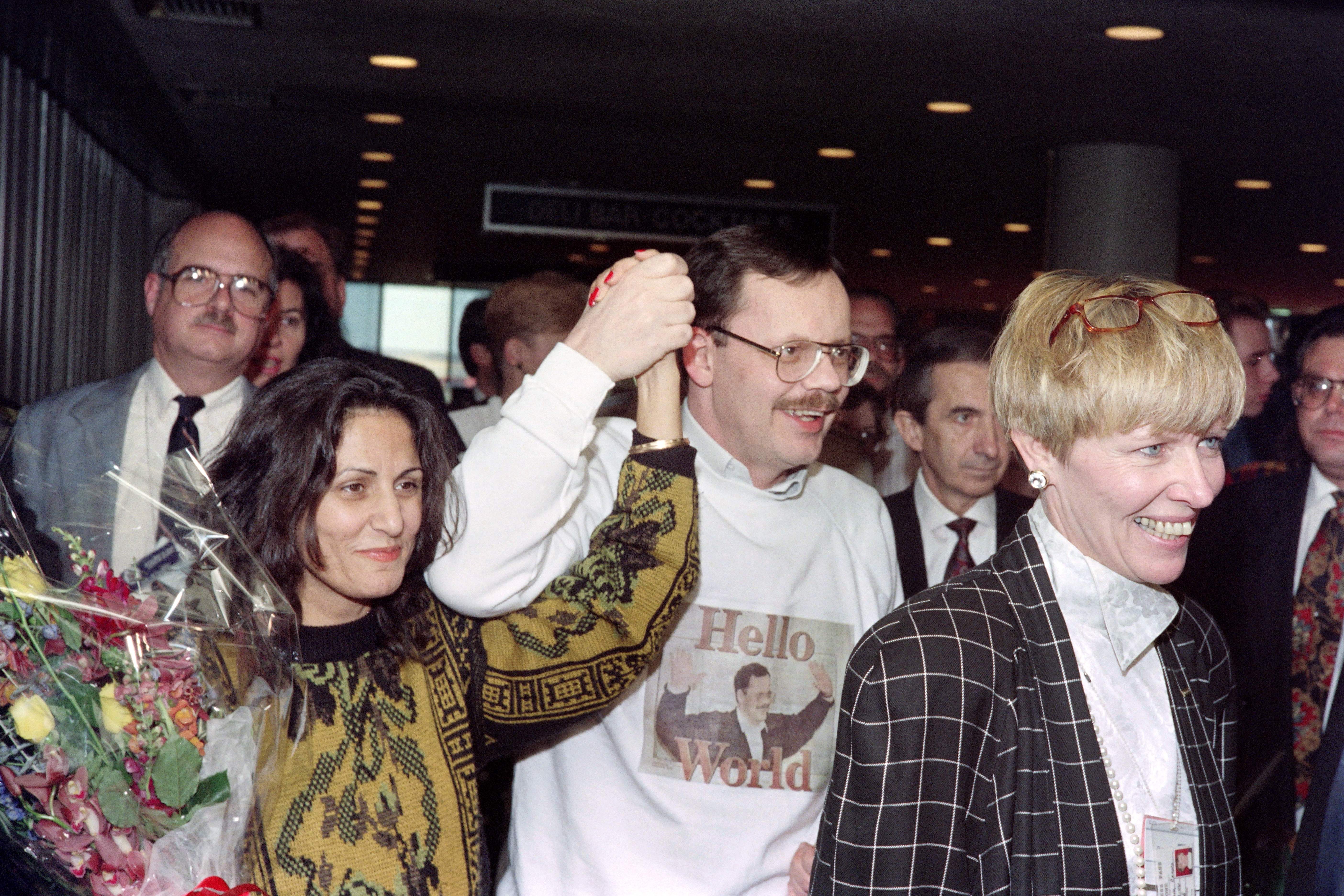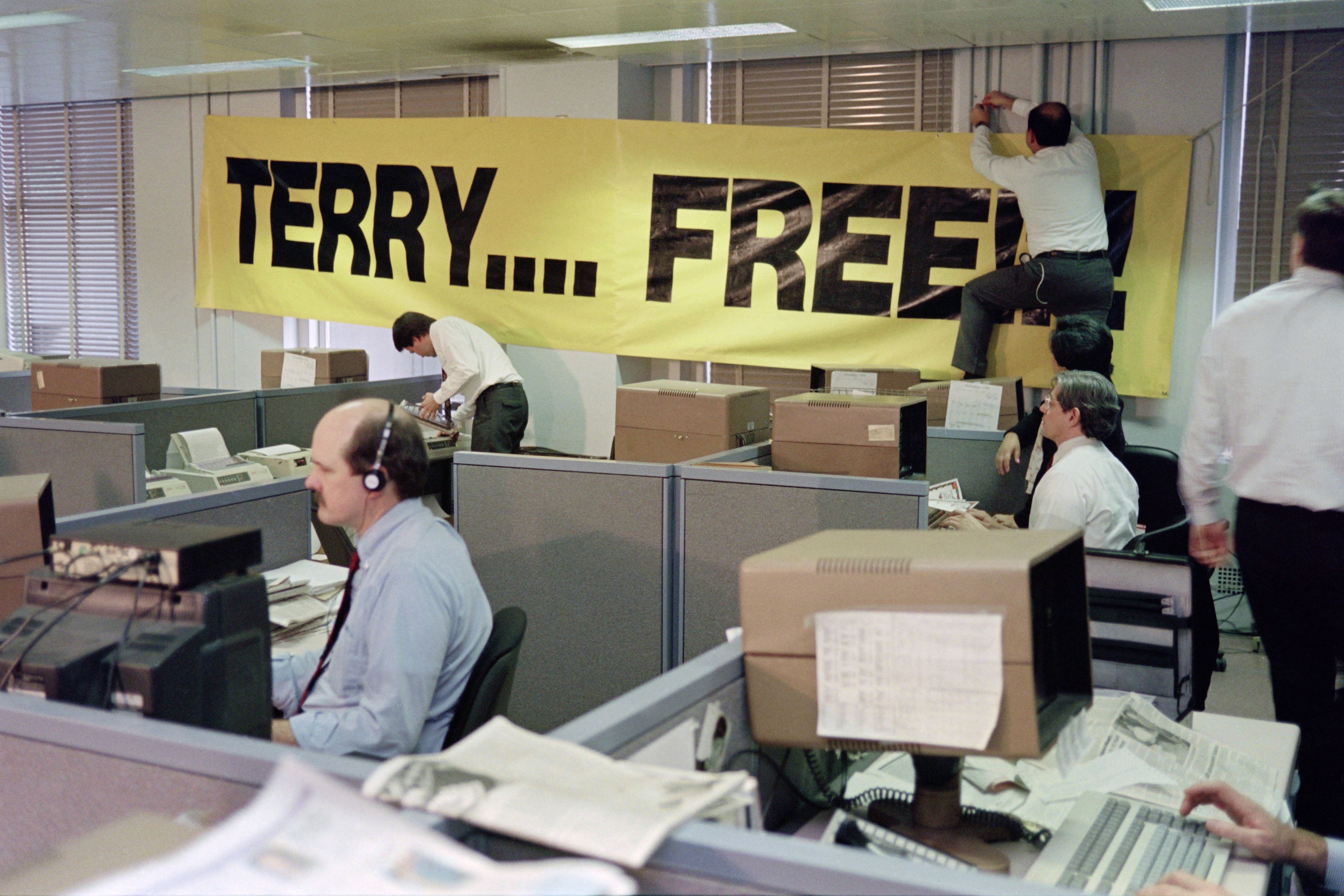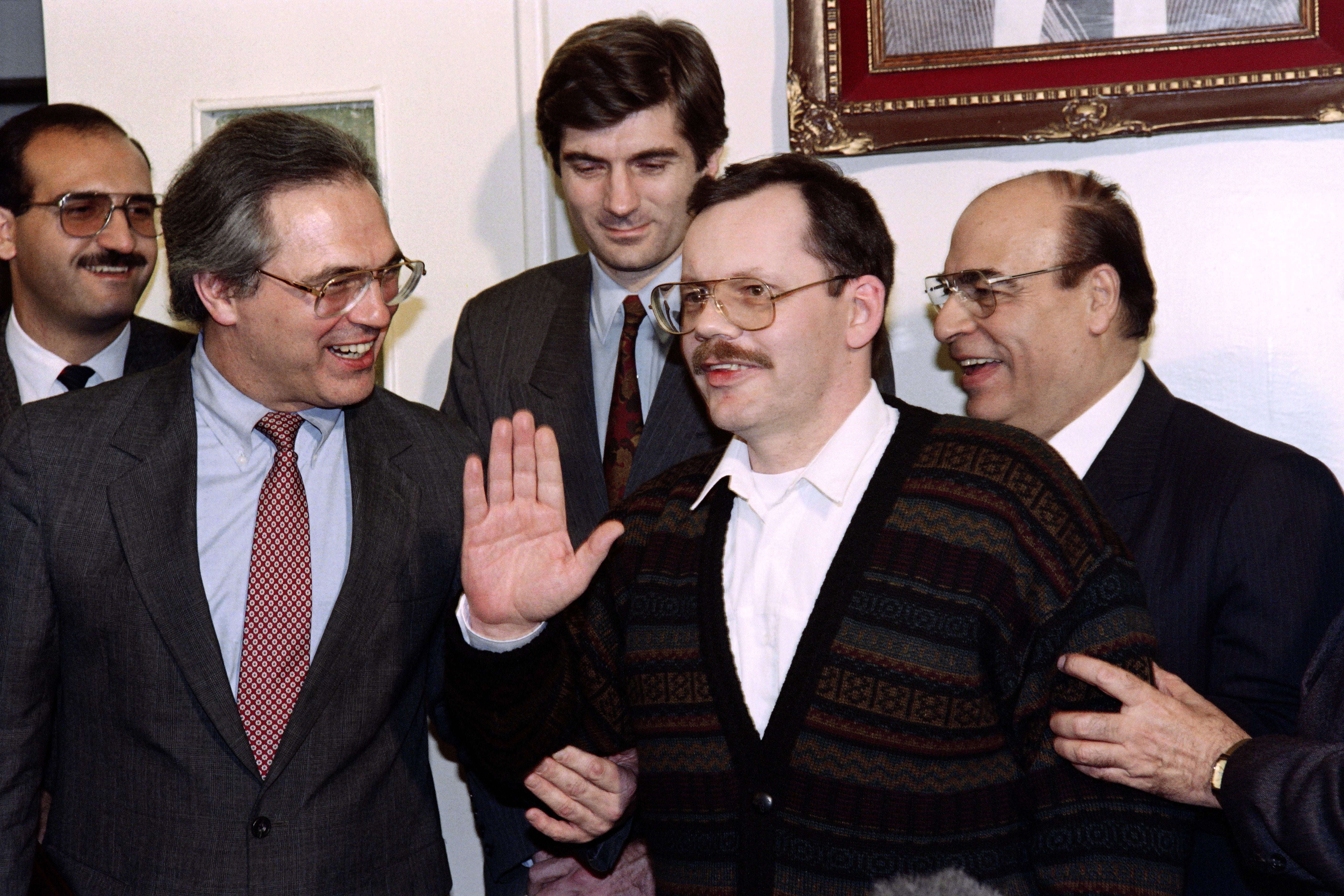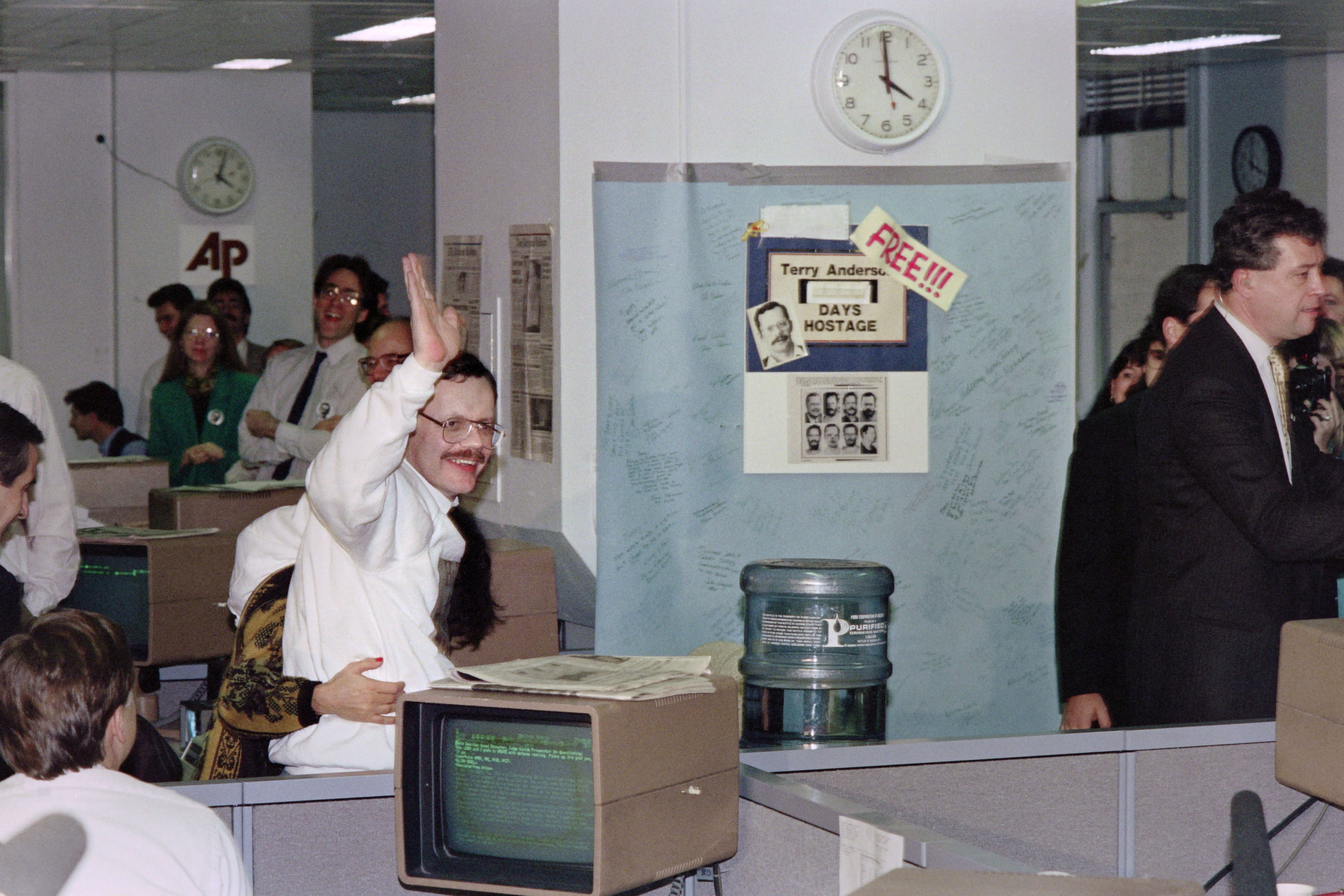‘Part of my life that disappeared’: The kidnapping of Terry from the flat downstairs
December 1991: Robert Fisk celebrates the release of his friend, hostage Terry Anderson


In the hours after Terry Anderson’s abduction, his driver, Muhieddin Habbal, and I had travelled all the way to Baalbek in the Bekaa valley where we guessed – correctly – he would be taken by his kidnappers.
We handed out his photograph to militiamen, shopkeepers, gunmen, Syrian soldiers and Islamic extremists. If his captors brought him this way, maybe the checkpoints would recognise a drugged Terry in the back seat, or demand to open the boot of every car. It was ridiculous, of course. Years later, I learnt I had given his picture to one of his kidnappers, earnestly entreating the stunned man to find my friend.
The photograph showed the tough, courageous Terry I knew so well; tiny eyes through frameless spectacles, brisk moustache and thick black hair, a retired United States marine who had served in Vietnam – a curriculum vitae we tried hard to keep from the kidnappers.
The picture sat on top of my car’s dashboard as we drove around the Bekaa, Terry’s face reproachful, a trifle resentful perhaps, wondering if we could find him. In Beirut, he would always demand that we go a little further, and order me to stop making excuses about going home every time a shell exploded.
“What’s the point of living in Lebanon if you won’t go look at what’s going on?” he asked me one morning in 1983 when we were trying to drive into the burning town of Bhamdoun. The place had been captured by the Druze from the Christian Phalange. My car was slithering on the oil that coated the road, my hands shaking with fear every time a shell swished over. “Why don’t you f****** well concentrate?” he had asked. “I thought you Brits had stiff upper lips – but you can’t even drive straight.”
On the day of his kidnap, I had a clear image of my old and trusted friend. It was Terry, sitting on the floor of his apartment a few hours earlier, holding up a glass of Lebanon’s finest Chateau Musar red wine and telling me why he would never struggle if anyone tried to kidnap him.
He could be just plain stupid, jogging on the corniche when westerners were already being kidnapped, ignoring his wife’s fear that working in Beirut was no longer worth the risks involved
“You’re out of your mind,” he had said when I suggested one should fight a kidnapper. “These guys have guns. You don’t have a chance... if they come, it’s better to let them take you.”
He was overweight and huffed and puffed when he was busy in the office, especially if someone annoyed him by missing a story. He had developed the habit of cat-napping across three chairs in his Associated Press bureau in west Beirut and I would find him on hot afternoons, stretched out like a great whale in the back room. “Anything I should know about?” he would ask. If the telex lines were down, he would wave a big right hand past the side of his face and say, “No problem.” He had learnt that from the Lebanese.
Terry lived three floors below me on the seafront in Beirut in a house packed with books, a wife and child, two cats and a massive South African ridgeback dog which regularly attacked strollers on the corniche.
He was strong, unflappable, unstoppable. And he was, to his friends, a truly faithful man. In the hours after his kidnapping, I recalled an afternoon when I had knocked on the door of his apartment in something approaching personal misery, after an unforgivable argument with my girlfriend. He took me to the balcony over the sea and placed his great bear-like arm around my shoulders. “But, Fisky, you know this wasn’t your fault, don’t you?” he had said. It was a lie. He knew it was a lie. But Terry would persuade you that it wasn’t, that all problems worked themselves out... When he was kidnapped on 16 March 1985, it was not just a friend but part of my life that disappeared.
Terry could be indolent – I once raged at him for forgetting to send my report to London on the computer wire as he had promised, wiping out a day’s work – and he could be just plain stupid, jogging on the corniche when westerners were already being kidnapped, ignoring his wife’s fear that working in Beirut was no longer worth the risks involved. But he wasn’t foolhardy. When we were almost killed together by a shell near the US marine base in Beirut – it was blown up by a suicide bomber a few weeks later – he gave me a crafty smile and said he was glad it was me who had to run across the road to fetch our car. “Did I ever tell you that I once killed a man in Vietnam?” he asked as we ran into a ruined house under fire. “When?” I asked. “Oh, I was going into a village with a patrol and two Vietcong appeared and I tripped over a tree trunk. They were raising their rifles but when I fell I shot one of them by accident. I was praised for my quick thinking. So you’re safe with me.”

When the marines fired mortars into the Lebanese Shia Muslim suburbs of west Beirut, Terry had no doubts where he should go. He sat with the Shia militiamen as the American shells exploded around him, recording the civilian casualties. “The marines have gone mad,” he said when he returned to his office with the story.
Once, after watching a baby die of burns caused by an Israeli phosphorous shell, he broke down at his typewriter and wept. But when someone lost his nerve, as he thought his photographer had during the Druze mountain war, he could be cruel, too. “I bullied him into going, didn’t I?” he said after they returned from a crazy trip.
How clear the image of Terry seemed then. And how imperceptibly and shamefully the image blurred. Within a day of his kidnap, we, his friends, began to talk about him in the past tense. Terry was, Terry had been, Terry used to be, as if he had died, which, in a way, he had, snatched from the dangerous world in which we lived and chained in darkness in a nether world. As the days and then the months and years passed by, we glimpsed him through a glass, darkly.
After Terry Waite’s first meeting with the Lebanese kidnappers in 1985, there appeared a photograph of Terry Anderson, his moustache long and drooping, his eyes dead as a doll’s, sightless without his spectacles. I tried to send him a picture of his daughter, Gabrielle, and a spare set of spectacles – the original pair dropped off at the time of his kidnap – through the mediation of a Lebanese friend. Months later, I learnt they had given him the picture but not the glasses.
There were to be more pictures as the years passed. Terry, distraught on a videotape, asking why President Reagan could not swap prisoners for his freedom if the Americans could (as they did) free a Soviet spy in return for a US journalist imprisoned in Moscow. Terry, staring in despair into a camera lens, perhaps thinking this was the only way for his family to see that he was still alive. Sometimes he looked like a Druze with his big moustache. At other times, he possessed the distraction of a fanatic, as if he was becoming as obsessed as his kidnappers.

His father, who was dying of cancer, pleaded for his release. Then his brother made the same appeal before he, too, died of cancer. His sister, Peggy, carried out a publicity campaign on his behalf. The mother of his second child – a six-year-old daughter whom he will now see for the first time – once asked me if he would still love her when he re-emerged into our world. I was sure he would.
In Beirut, I could do nothing save plead and whine whenever I talked to Shia militia leaders. I eventually asked one of Terry’s kidnappers what compassion he felt for my friend – the same compassion, he said, he felt for the Lebanese prisoners in Israel’s Khiam jail – and in the end I could do no more. I spent many of the years of Terry’s captivity trying to stay away from the kidnappers, more frightened for my own safety than his. Terry had already entered the dark world. I didn’t want to join him there. I would always talk to Shias about his courage among them when the marines fired into the southern slums, about his innocence, his duty as a journalist to be in Lebanon. I think, looking back on it, I was trying to keep him alive. Outside Lebanon, there were campaigns and prayer meetings and church services and statements by presidents and friends. And in his cell – where once he beat his head until blood ran down the walls – he heard about these demonstrations. They helped him and they proved to the kidnappers that he was a good man.
I used to send messages to his captors asking to be allowed to see him, to be permitted to ‘lift the burden of his imprisonment’ as I pompously used to put it. It was hopeless
But the image went on blurring. Whole days would pass when I would not think of Terry. His daughter, Sulome, sent him birthday greetings – he was eventually allowed to watch her on Lebanese television – and her mother, Madeleine, waited as few other women have ever waited for their men. From Lebanon, I would go on holiday and quite forget my friend. Six years is so long a time. I would fly back into Beirut airport and know that Terry was incarcerated only a few hundred yards from me. I was once within 20ft of his cell, though I did not know it. But, at the time, I was trying to avoid being shot by Palestinian snipers and afraid that the bearded men around me might kidnap me.
I met an Iranian who suggested Terry might be freed if I could persuade the Americans to find four missing Iranians. In different circumstances and about other captives, this demand would later be made public by the Iranian government.
Then the Iranian suggested that guns might be swapped for Terry, and I fled from him. One sinister afternoon, an American caller rang me in Beirut to ask me to visit the Frankfurt Book Fair to see “a person” about Terry. I took fright and refused. Only years later did I find that the “person” was going to be Oliver North. If there was a lesson for an individual in Beirut at that time, for someone who wanted to help a hostage friend, it was that the world was a place of betrayal.
I did write a book about Lebanon in which Terry was the hero. It appeared in Beirut in Arabic and was read by the Hizbollah, and by Terry’s captors, and it told them about his life as a journalist, his professional integrity and his courage. I doubt if it helped. I used to send messages to his captors asking to be allowed to see him, to be permitted to “lift the burden of his imprisonment” as I pompously used to put it. It was hopeless. In the end, I had to admit that even in the city in which he was held prisoner, I could do nothing. I failed.

His family and his friends outside Lebanon did not. They reminded him constantly of their love for him. Terry Waite gave up almost five years of his life for him, which is why I cannot fail to sympathise with the archbishop’s envoy as journalists diligently – and rightly – prowl through his past activities in Lebanon. The Lebanese staff of Terry Anderson’s news agency remembered him in pictures and with weird birthday parties in which the principal guest was necessarily absent.
A videotape of Terry talking into a kidnapper’s camera two months ago did look like the Terry I knew, careful, humorous, slightly irritable. Terry Waite, John McCarthy and Tom Sutherland brought stories of the heroic and resourceful Terry I remembered. Long ago, in 1986, he had sent me a message from his prison cell, telling me to leave Lebanon, that I was in danger of my life. I ignored it, arrogantly deciding that he could not tell me what to do from a basement.
A few days ago, I received a different message. Terry would like to see me when he is freed, it said. After six and a half years, the photograph I carried around the Bekaa on the dashboard of my car has again become reality and all of us who knew – or know – Terry will ask ourselves what we did wrong, what we failed to do, what we might have done. It will not be a happy accounting for anyone who lived on in Beirut. The only man who did that with honour was Terry Anderson.
Join our commenting forum
Join thought-provoking conversations, follow other Independent readers and see their replies
0Comments